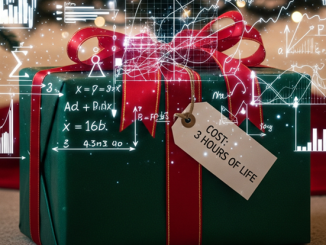
Every year at a certain time, many of us ask ourselves for what to give to our loved ones. We rush into the shopping malls or push the servers of online retailers to their limits. Our motivation is obvious: we want to find the ideal gift to make someone else very happy. The benefit at the macroeconomic level is easy to measure: as consumer spending increases, general demand increases and gross domestic product (GDP) rises. In Germany in 2020, Christmas sales accounted for 18.9% of total retail sales, while for consumer electronics it was as high as 23.9% (Ahrens 2021). If we take half of December and half of November as the peak season, these sales fall to only 1/12 or 8.3% of the total year.
However, how does the benefit look at the individual level – and this does not mean the individual stores but rather the individual gift givers and gift recipients. In 1993, there was a much-cited paper (Waldfogel 1993) on the question of how to assess the benefit in this case. Unfortunately, it came to a very disillusioning result: There are considerable welfare losses of 10% up to one third of the gift value. That is, a gift with a value of 100 euro is worth on average only 66 to 90 euros to the recipients.
How can this be? The economic reason is simple: The best thing that gift-givers can do is to give the recipients exactly what they want. Otherwise, one receives something about which one is … pleased.
In particular, the distance in the relationship between the giver and the recipient matters here. The wider the distance between the two, the greater the loss. Since gift givers are often conscious that they can only estimate the preferences and desires of the giftee with a substantial risk, they give cash more often than material gifts. This makes sense from an economic perspective, since the recipients have the freedom to choose something according to their preferences.
Unfortunately, this analysis is very disappointing and not Christmassy at all. Should rational people therefore refrain from gift-giving? As is so often the case in academia, however, there are critical comments on these results, particularly taking issue with the group of people surveyed (Yale undergraduates in economics) (Solnick/Hemenway 1996). If another, partly older group of persons is interviewed, exactly the opposite is shown: There is a welfare gain, since the recipients would pay on average 11% more for the gift than the gift givers actually spent. In particular, it is positively evaluated that the gift givers have put some thought into the gift or that the giftee has received something that they would like to have, but would never have bought themselves. Cash gifts were not particularly well received in this survey. These results are much more encouraging.
Many other studies find pros and cons for both sides (see Merler 2018 for an overview), leaving no clear consensus on whether Christmas gifts increase or decrease welfare. In the end, the usual answer is: It depends! After all, everyone is different and gift giving is a deeply personal matter. Especially in the current times, the greatest gift is probably not a thing or money, but community with beloved ones. In this spirit: Merry Christmas!
Literature:
- Ahrens, Sandra (2021): Anteil des Weihnachtsgeschäfts am Jahresumsatz in ausgewählten Einzelhandelsbranchen in Deutschland im Jahr 2020. (Retrieved December 13, 2021)
- Merler, Silvia (2018): The Microeconomics of Christmas, Bruegel Blog Post. (Retrieved December 13, 2021)
- Solnick, Sara & David Hemenway (1996): The Deadweight Loss of Christmas: Comment, The American Economic Review, 86(5), pp. 1299–1305.
- Waldfogel, Joel (1993): The Deadweight Loss of Christmas, The American Economic Review, 83(5), pp. 1328–1336.
The author is responsible for the content and form of this article.




